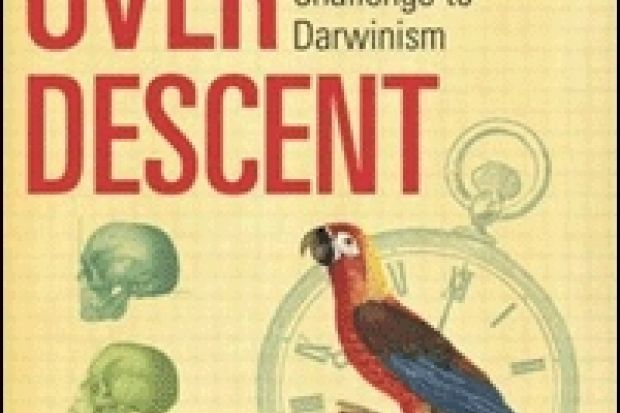Steve Fuller is professor of sociology at the University of Warwick and a sociologist of science. His most general argument, captured by the subtitle, "Intelligent Design's Challenge to Darwinism", is that some sort of "intelligent design" (ID) theory underlay the development of the natural sciences, and still provides the best justification for the intelligibility of nature that the sciences presuppose. Darwinism, on the other hand, denies that nature is intelligible or that the human mind is fitted to understand it, and has assumed the status of a repressive orthodoxy that could stifle creative research in biology.
Fuller describes himself as a secular humanist, and his argument is not quite what one might expect. In fact, it is full of historical surprises and ingenious interpretations of the history of science. He questions whether there is really a scientific consensus about very much, attributing its perceived existence to a slavish obedience to authority. He argues that the very concept of a "scientist" arose from the belief that humans are created in the image of God, and so they can continue and even improve the divine work of creation. He dismisses "theistic evolution" as an "intellectual mirage" and a feeble compromise, and calls for "ID creationists" to assert their views, even providing a strategy for them to follow. He defends astrology as having been entirely rational and scientifically fruitful in its day, even though it has now been shown to be based on false premises. And he defends "Biblical literalism" as an important driver of productive science, not as a barrier to scientific research.
I hope this gives the flavour of the book - a rich mine of often-overlooked information, personal interpretations of the history of science that are provocative and sometimes astonishing, and a sceptical sociologist's view of the grand narrative that science, and especially the neo-Darwinian synthesis, is apt to claim for itself.
The richness and complexity of argument defy critical summary. I have to say, however, that I was unhappy with the description of ID as "scientifically-credentialed creationism", or with lumping together all who believe there is a creator as "creationists". It may lead to Fuller's book being taken as a defence of the "six-day creation" view that rejects evolution entirely, or as a defence of an "intelligent design" view that claims to point to specific biological facts that require, on scientific grounds, appeal to an intelligent designer.
The "theistic evolution" view that he mocks accepts the fact of evolution, and attributes it to intelligent design by God, without holding that any specific biological data require an intelligent designer as part of their scientific explanation. It could be reasonably argued that this was Darwin's own view, although Darwin became sceptical of some specific Christian doctrines. Fuller does not reference his claim that "Darwin's considered opinion was that design is illusory", and Darwin often said the opposite.
Upholders of theistic evolution usually espouse "methodological naturalism", which Fuller characterises as a "pseudo-philosophy" fuelled by bigotry. I have always understood it to be the view that properly scientific explanations refer only to "natural" (spatio-temporal) data, without denying that other data (like God) may exist, and have some form of causal influence, not falling within the purview of observational and experimental science. Fuller claims it is a conflation of logical positivism (all factual statements must be verifiable) and metaphysical naturalism (only natural causes exist). This claim is puzzling, as methodological naturalism is a term invented precisely to contrast with metaphysical naturalism, and no naturalist is committed to a positivist doctrine of meaning and verification. I cannot see how it is "anti-religious bigotry" to say that God's acts cannot be unambiguously verified by public observation, or repeated, or experimentally tested. Indeed, this seems to be a common religious view, and even to follow from the fact that God is not a material entity and that God's acts obey no general causal laws.
In general there are two main strategies for a religious believer with regard to modern science. "Science" can be restricted to the realm of the material parts of reality, or "science" can be extended to embrace all aspects of reality, including the spiritual. Fuller seems to take the latter course. He regards the former as a sort of intellectual surrender that has impeded the advancement of science in the past, and that undermines belief in the intelligibility of reality (since, he says, on a Darwinian account, scientific truth is merely a chance evolutionary by-product). In my view, this confuses philosophical theories that may drive science with scientific theories themselves. If one holds a purposive view of nature, then evolutionary biology must be consistent with that. But it does not follow that the testable findings of Christian biologists must differ from those of atheists. There is a difference of cognitive content, but it is not in the science; it is in the deeper belief about the existence of a creator, to which revelation and experience are more relevant than biology.
Religious faith should have empirical consequences, and since scientific explanation is "a general explanation for disparate phenomena", Fuller argues that there is no reason to call ID non-scientific. It is a good integrating hypothesis - as good as astrology (now disproved) and Darwinian evolution (another grand theory that may soon be disproved). He provides interesting examples of how religiously inspired ID views have driven the work of many eminent biologists, and suggests that ID should be promoted as "an openly religious viewpoint with scientific aspirations".
Fuller argues that seeing humans as creatures in imago dei (which, incidentally, Muslims do not) entails seeing them as called upon to improve nature by, for instance, genetic engineering. It is odd, then, that this is precisely what many Christians do not believe. He also repeatedly speaks of divine creation as a struggle against "unruly matter", in which God achieves his goal through a sort of opportunistic optimisation - thereby encouraging us to follow his example, and adopt a "Faustian" attitude to nature. That thought, too, though intriguing, hardly represents orthodox Christian views - maybe it is actually heretical religion that has driven science.
Fuller's account of Biblical literalism also looks unlike what anyone else means by it. He says literalism is not a plain descriptive account or "fixed doctrine", but an "act of communication" demanding a personal response. But in biblical hermeneutics, this is just what is opposed to "literalism". So his positive view turns out to be idiosyncratic and possibly misleading - what he defends is rarely what the people he defends think.
He achieves his aims of forcing readers to re-examine the terms of the evolution versus intelligent design debate, to see how ID-type views have driven scientists in the past, and to question a view of science as "a unified mode of inquiry with a uniquely progressive character". Even should the book fail to convince, it will certainly not fail to stimulate.
There is a major proofreading error on page 173, which turns the Ontological Argument into nonsense. Deleting the word "that" will restore sense.
THE AUTHOR
Professor of sociology, radio enthusiast, keen runner and sometime dance-floor star Steve Fuller also finds time to support academic freedom, put on plays and write the odd book.
His tendency to keep busy started at Columbia University where he combined a double honours degree with the night shift on a local radio station. "I worked the graveyard shift ... playing whole LP sides of Pink Floyd or Led Zeppelin, until someone called up wanting to hear Bohemian Rhapsody."
He went on to gain a masters from Cambridge and a PhD from the University of Pittsburgh, both in the history and philosophy of science. He celebrated another achievement when he won a dance contest in Virginia, dancing to New Order's Blue Monday.
He subsequently held assistant and associate professorships at the University of Colorado at Boulder, Virginia Tech and, again, Pittsburgh. In 1994 he was appointed to the chair in sociology and social policy at Durham University, moving in 1999 to his current post at Warwick.
In 2007 Warwick awarded him a higher doctorate for work "forming a major contribution to a subject".
Fuller has been one of the most visible supporters of the UK group Academics for Academic Freedom, believing that academic freedom refers to a freedom reserved for academics, not a special case of freedom of speech. Controversially, it includes the right to give offence as long as it is done within the terms of reason and evidence that is appropriate to the academic profession, to open up topics for further debate that can result in progress.
Sarah Cunnane
Dissent over Descent: Intelligent Design's Challenge to Darwinism
By Steve Fuller
Icon Books, 2pp, £12.99
ISBN 9781840468045
Published 12 June 2008
Register to continue
Why register?
- Registration is free and only takes a moment
- Once registered, you can read 3 articles a month
- Sign up for our newsletter
Subscribe
Or subscribe for unlimited access to:
- Unlimited access to news, views, insights & reviews
- Digital editions
- Digital access to THE’s university and college rankings analysis
Already registered or a current subscriber? Login




